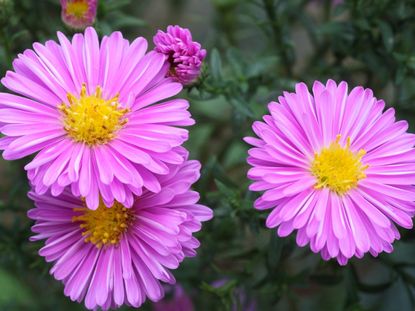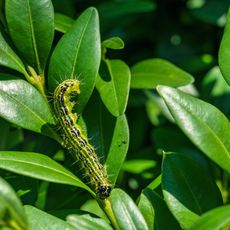New England Aster Plant Care: How To Grow New England Aster Plants


Looking for a burst of color for your fall garden? The New England aster plant (Aster novi-angliae) is an easy to care for perennial, blooming from August through October. Most North American gardeners can learn how to grow New England aster. Once established in the garden, New England aster care is extremely easy. Keep reading for more information on growing New England asters.
New England Aster Flowers
A wildflower member of the Asteraceae family and native to the eastern and central United States, New England aster flowers are generally found in meadows and other moist, well draining soils. The New England aster plant has medium green to gray-green foliage with an odor somewhat reminiscent of turpentine when crushed. Don't let the unpleasant aroma put you off, however. This plant provides stunning rose to lilac or deep purple blooms in mass plantings within native species gardens, low-lying areas, along roadsides, and around tree lines. The brilliant blooms make great cut flowers and are longer lasting in water than its cousin the New York aster (A. novi belgi). The floral display provides color long into the waning days of summer. Other varieties of New England aster flowers are available for the home garden as well and will provide additional color. These include:
- ‘Alma Potschke' produces 3 ½ foot (1 m.) tall plants with vibrant pink blooms.
- ‘Barr's Pink' blooms are rose colored, semi-double flowers on a 3 ½ foot (1 m.) tall plant.
- ‘Harrington's Pink' lights the garden with 4 foot (1 m.) tall pink blossoms.
- ‘Hella Lacy' is a 3 to 4 foot (1 m.) tall plant with dark purple blooms.
- ‘Honeysong Pink' has yellow centered pink flowers on 3 ½ foot (1 m.) tall plants.
- ‘September Beauty' blooms a deep red on 3 ½ foot (1 m.) tall plants.
- ‘September Ruby' flowers are rosy red atop 3 to 4 foot (1 m.) tall plants.
How to Grow New England Asters
Growing New England asters, as with other aster plants, is easy. This particular aster variety prefers full to partial sun in USDA plant hardiness zones 4 through 8. Propagate by seed or division when growing New England asters. Although a bit more difficult to grow from seed, it is well worth the effort. Surface sow in the spring in an area of rich, moist soil as these plants tend to wilt in poorly drained clay. The New England aster will germinate in 21 to 45 days at a soil temperature of 65 to 75 degrees F. (8-24 C.). These late summer through early fall bloomers spread 2 to 4 feet (0.6-1 m.) with a height of 1 to 6 feet (0.3-2 m.). When planting make sure to provide good air circulation, keeping in mind the large spreading area.
New England Aster Care
New England aster care is moderate. Just divide in fall, fertilize, and cut back in spring. These daisy like flowering plants should be divided every two to three years in late fall to promote vigorous specimens. The taller varieties, such as the 4 foot (1 m.) tall bluish purple ‘Treasurer' or the nearly 5 foot (1.5 m.) tall purple-red 'Lyle End Beauty,' usually require staking. Pinch plants early in the season to get a lower growing and bushier plant or choose a dwarf variety like ‘Red Star,' 1 to 1 ½ feet (31-46 cm.) with deep rosy flowers, or the aptly named ‘Purple Dome.' New England aster flowers may also self seed in optimal conditions. Be aware of this self-sowing when growing New England asters. To avoid self-seeding in the garden, cut back after blooming. This non-invasive beauty is fairly disease and insect resistant, however, it may be prone to powdery mildew. Keep soil moist as mentioned above and prepare to enjoy this hardy and bountiful perennial for years to come.
Gardening tips, videos, info and more delivered right to your inbox!
Sign up for the Gardening Know How newsletter today and receive a free download of our most popular eBook "How to Grow Delicious Tomatoes."

Amy Grant has been gardening for 30 years and writing for 15. A professional chef and caterer, Amy's area of expertise is culinary gardening.
-
 Urban Composting Guide: How To Compost In The Middle Of The City
Urban Composting Guide: How To Compost In The Middle Of The CityUrban composting does not have to be daunting. You can compost in the city, and maybe even try some urban worm composting!
By Mary Ellen Ellis
-
 Shrub Diseases And Pests To Watch Out For
Shrub Diseases And Pests To Watch Out ForShrub diseases and pests can be challenging. Learn how to recognize and eradicate them before they can present a danger to your plants.
By Susan Albert